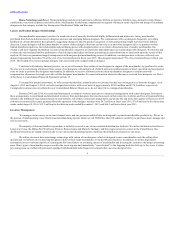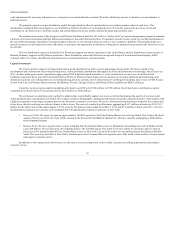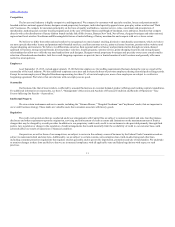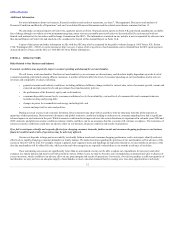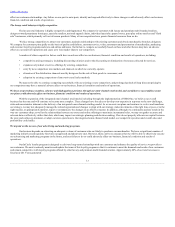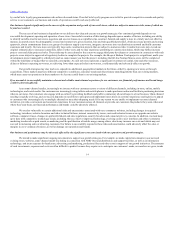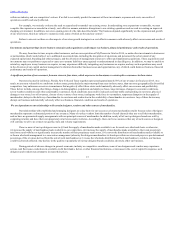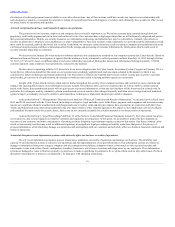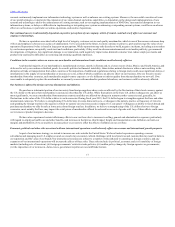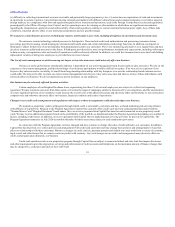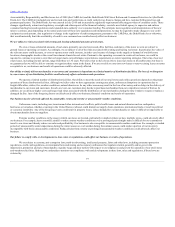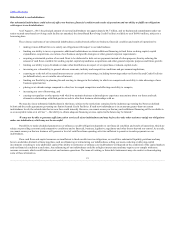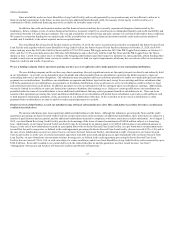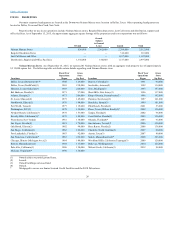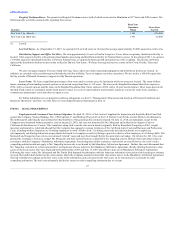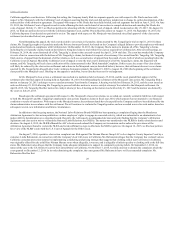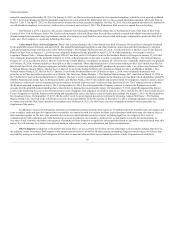Neiman Marcus 2014 Annual Report Download - page 20
Download and view the complete annual report
Please find page 20 of the 2014 Neiman Marcus annual report below. You can navigate through the pages in the report by either clicking on the pages listed below, or by using the keyword search tool below to find specific information within the annual report.
Table of Contents
Accountability Responsibility and Disclosure Act of 2009 (the CARD Act) and the Dodd-Frank Wall Street Reform and Consumer Protection Act (the Dodd-
Frank Act). The CARD Act included new and revised rules and restrictions on credit card pricing, finance charges and fees, customer billing practices and
payment application. The Dodd-Frank Act was enacted in July 2010 and increased the regulatory requirements affecting providers of consumer credit. These
changes significantly restructured regulatory oversight and other aspects of the financial industry, created a new federal agency to supervise and enforce
consumer lending laws and regulations and expanded state authority over consumer lending. We anticipate more regulation and interpretations of the new
rules to continue, and, depending on the nature and extent of these new regulations and interpretations, we may be required to make changes to our credit
card practices and systems. Any regulation or change in the regulation of credit arrangements, pursuant to the CARD Act, the Dodd-Frank Act or otherwise,
that would materially limit the availability of credit to our customer base could adversely affect our business.
We are subject to risks associated with owning and leasing substantial amounts of real estate.
We own or lease substantial amounts of real estate, primarily our retail stores and office facilities, and many of the stores we own are subject to
ground leases or operating covenants. Accordingly, we are subject to all of the risks associated with owning and leasing real estate. In particular, the value of
the relevant assets could decrease, or costs to operate stores could increase, in either case because of changes in the supply or demand of available store
locations, demographic trends or the overall investment climate for real estate. Pursuant to the operating covenants in certain of our leases, we could be
required to continue to operate a store that no longer meets our performance expectations, requirements or current operating strategies. The terms of our real
estate leases, including renewal options, range from three to 130 years. We believe that we have been able to lease real estate on favorable terms, but there is
no guarantee that we will be able to continue to negotiate these terms in the future. If we are not able to enter into new leases or renew existing leases on terms
acceptable to us, our business and results of operations could be adversely affected.
Our ability to timely deliver merchandise to our stores and customers is dependent on a limited number of distribution facilities. The loss of, or disruption
in, one or more of our distribution facilities could adversely affect our business and operations.
We operate a limited number of distribution facilities. Our ability to meet the needs of our retail stores and online operations depends on the proper
operation of these distribution facilities. Although we believe that we have appropriate contingency plans, unforeseen disruptions in operations due to
freight difficulties, strikes, fire, weather conditions, natural disasters or for any other reason may result in the loss of inventory and/or delays in the delivery of
merchandise to our stores and customers. In such an event, our customers may decide to purchase merchandise from our competitors instead of from us. In
addition, we could incur higher costs and longer lead times associated with the distribution of our merchandise during the time it takes to reopen or replace a
damaged facility. Any of the foregoing factors could adversely affect our business, financial condition and results of operations.
Our business may be adversely affected by catastrophic events and extreme or unseasonable weather conditions.
Unforeseen events, including war, terrorism and other international conflicts, public health issues and natural disasters such as earthquakes,
hurricanes or tornadoes, whether occurring in the United States or abroad, could disrupt our supply chain operations, international trade or result in political
or economic instability. Any of the foregoing events could result in property losses, reduce demand for our merchandise or make it difficult or impossible to
obtain merchandise from our suppliers.
Extreme weather conditions in the areas in which our stores are located, particularly in markets where we have multiple stores, could adversely affect
our business. For example, heavy snowfall, rainfall or other extreme weather conditions over a prolonged period might make it difficult for our customers to
travel to our stores and thereby reduce our sales and profitability. Our business is also susceptible to unseasonable weather conditions. For example, extended
periods of unseasonably warm temperatures during the winter season or cool weather during the summer season could render a portion of our inventory
incompatible with those unseasonable conditions. Reduced sales from extreme or prolonged unseasonable weather conditions could adversely affect our
business.
Our failure to comply with, or developments in, laws, rules or regulations could affect our business or results of operations.
We are subject to customs, anti-corruption laws, truth-in-advertising, intellectual property, labor and other laws, including consumer protection
regulations, credit card regulations, environmental laws and zoning and occupancy ordinances that regulate retailers generally and/or govern the
importation, promotion and sale of merchandise, regulate wage and hour matters with respect to our employees and govern the operation of our retail stores
and warehouse facilities. Although we undertake to monitor our compliance with and developments in these laws, rules and regulations, if these laws are
violated by
19


